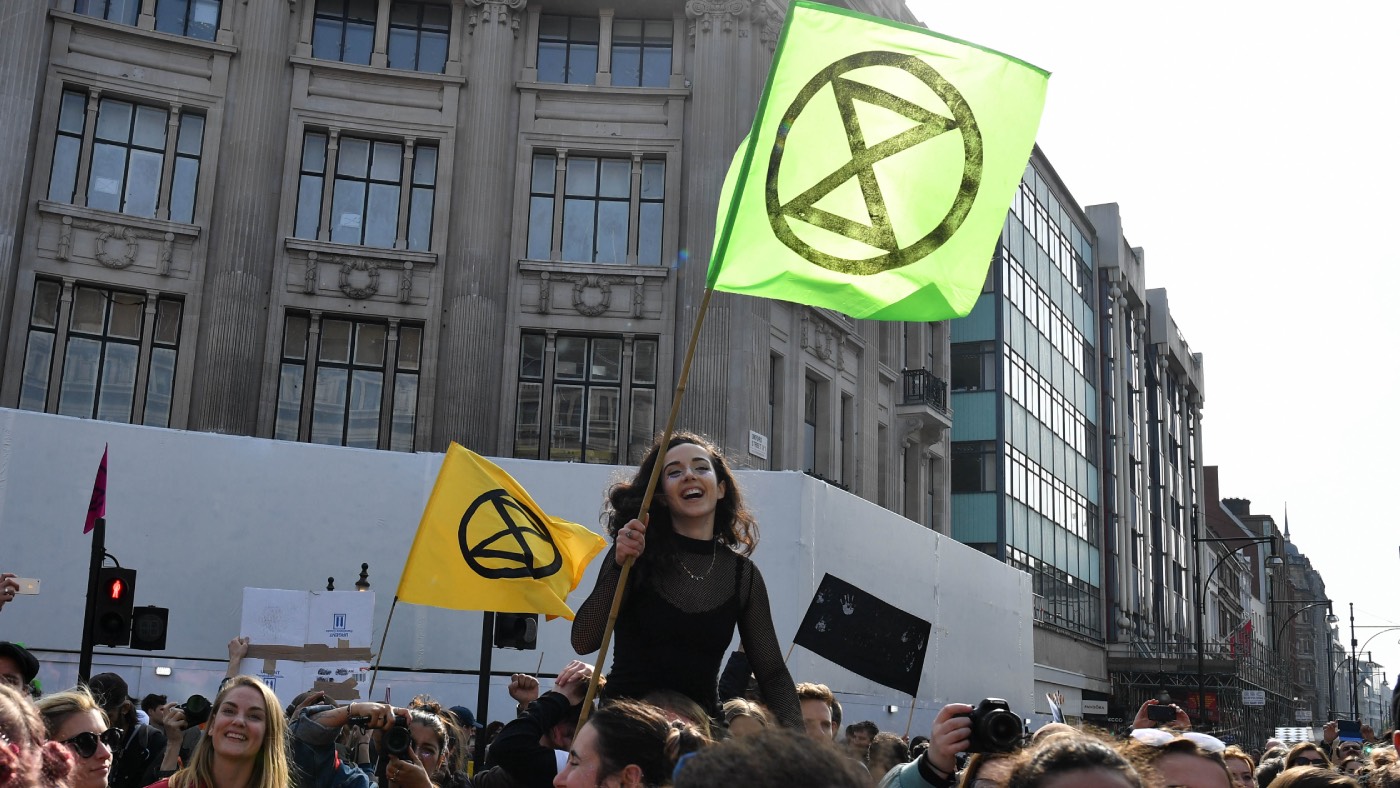Extinction Rebellion protesters block roads
Climate change activists say they will escalate actions in coming days

A free daily email with the biggest news stories of the day – and the best features from TheWeek.com
You are now subscribed
Your newsletter sign-up was successful
Climate change activists blocked roads and vandalised the headquarters of Shell yesterday as protests organised by the Extinction Rebellion group continued.
Thousands of people joined the demonstrations across central London as campaigners parked a pink boat at Oxford Circus and blocked Waterloo Bridge, Marble Arch, Piccadilly Circus and roads around Parliament Square. Police arrested 52 protesters.
At the Shell HQ, a glass revolving door was shattered and two activists climbed above the entrance, writing “Shell knew” and “Shell knows” on the building. A protestor who glued himself to the building's revolving door said: “Shell has known about the impact the fossil fuel industry is having on our planet for decades. They've done nothing but deceive, lie and undermine any efforts at transition to renewables.”
The Week
Escape your echo chamber. Get the facts behind the news, plus analysis from multiple perspectives.

Sign up for The Week's Free Newsletters
From our morning news briefing to a weekly Good News Newsletter, get the best of The Week delivered directly to your inbox.
From our morning news briefing to a weekly Good News Newsletter, get the best of The Week delivered directly to your inbox.
Extinction Rebellion is calling on the UK government to reduce carbon emissions to zero by 2025 and form a citizens’ assembly to urgently tackle climate breakdown and biodiversity loss. It is part of a global campaign, with demonstrations planned in 80 cities across 33 countries in the coming days.
In response, the Metropolitan police has arrested demonstrators after issuing an order under section 14 of the Public Order Act, which allows conditions to be imposed on “public processions” and “public assemblies”. However, demonstrators said the arrests were being made at a gradual rate.
Commenting on the protestors’ tactics, one of the environmentalist movement’s leaders said: “Suddenly what Extinction Rebellion has done is actually say: ‘we are doing this.’ And the state is so weak through austerity that they can’t stop us.”
Several major roads in the capital were brought to a standstill with roads gridlocked in surrounding streets. The AA said the disruption had been significant.
A free daily email with the biggest news stories of the day – and the best features from TheWeek.com
Extinction Rebellion says their actions are based on research into how to use “non-violent civil disobedience to achieve radical change”.
The group has written to Theresa May, warning that the group will escalate its disruptive actions over the coming days and weeks unless the government acts on its demands.
-
 How the FCC’s ‘equal time’ rule works
How the FCC’s ‘equal time’ rule worksIn the Spotlight The law is at the heart of the Colbert-CBS conflict
-
 What is the endgame in the DHS shutdown?
What is the endgame in the DHS shutdown?Today’s Big Question Democrats want to rein in ICE’s immigration crackdown
-
 ‘Poor time management isn’t just an inconvenience’
‘Poor time management isn’t just an inconvenience’Instant Opinion Opinion, comment and editorials of the day
-
 The plan to wall off the ‘Doomsday’ glacier
The plan to wall off the ‘Doomsday’ glacierUnder the Radar Massive barrier could ‘slow the rate of ice loss’ from Thwaites Glacier, whose total collapse would have devastating consequences
-
 Can the UK take any more rain?
Can the UK take any more rain?Today’s Big Question An Atlantic jet stream is ‘stuck’ over British skies, leading to ‘biblical’ downpours and more than 40 consecutive days of rain in some areas
-
 As temperatures rise, US incomes fall
As temperatures rise, US incomes fallUnder the radar Elevated temperatures are capable of affecting the entire economy
-
 The world is entering an ‘era of water bankruptcy’
The world is entering an ‘era of water bankruptcy’The explainer Water might soon be more valuable than gold
-
 Climate change could lead to a reptile ‘sexpocalypse’
Climate change could lead to a reptile ‘sexpocalypse’Under the radar The gender gap has hit the animal kingdom
-
 The former largest iceberg is turning blue. It’s a bad sign.
The former largest iceberg is turning blue. It’s a bad sign.Under the radar It is quickly melting away
-
 How drones detected a deadly threat to Arctic whales
How drones detected a deadly threat to Arctic whalesUnder the radar Monitoring the sea in the air
-
 ‘Jumping genes’: how polar bears are rewiring their DNA to survive the warming Arctic
‘Jumping genes’: how polar bears are rewiring their DNA to survive the warming ArcticUnder the radar The species is adapting to warmer temperatures